If you’ve ever stood before an impressive-looking building, admired a meticulously planned infrastructure project, or wondered about the orchestration behind a construction site, you’re in the right place.
In this article, we’re taking a closer look at the unsung hero of construction projects—the construction operations manager.
These professionals are the masterminds behind the scenes, ensuring that everything runs like a well-oiled machine from project inception to completion.
It’s a truly complex role that requires a unique blend of strategic thinking, organizational skills, and a knack for problem-solving.
Whether you’re a construction enthusiast, an industry insider, or just an individual curious about the complexities of building something from the ground up, this article will surely prove to be interesting and illuminating.
In this article...
Construction Operations Manager Role
Let’s first start with the fundamentals and explore what being a construction operations manager actually means.
Job Description
Construction work is far more complex than just stacking bricks or operating heavy machinery and no one understands this better than construction operations managers.
In essence, their main task is overseeing various aspects of operations simultaneously to ensure projects are completed on time and within budget.
To do this successfully, operations managers have to collaborate with and coordinate many people on a daily basis, including not only architects, engineers, contractors, and subcontractors, but construction material suppliers, and clients as well.
To get a clearer understanding of the role, take a look at an example job description below, which we based on real-life job advertisements.
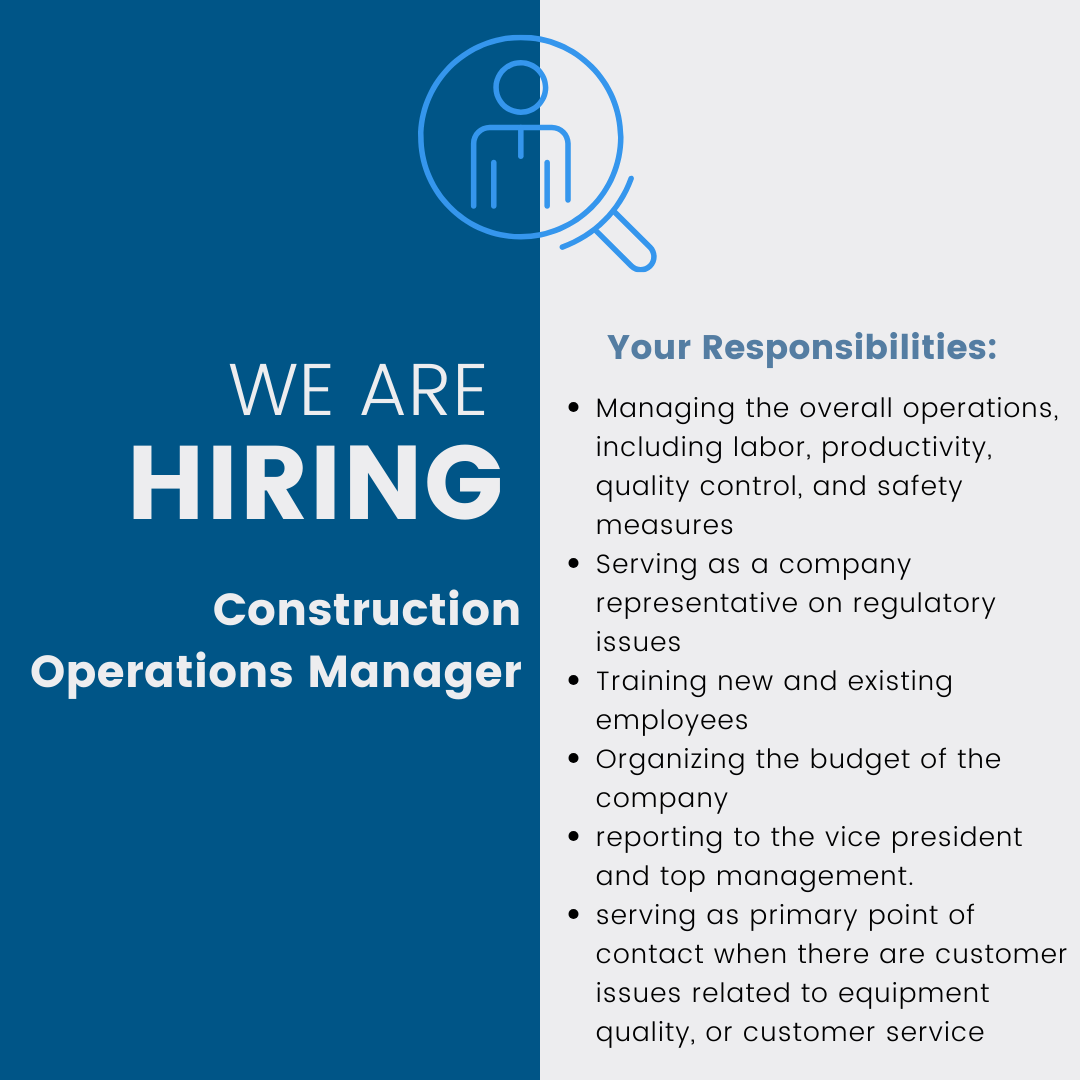
In short, operations managers do it all—from planning, scheduling, and budgeting to evaluating safety standards, ordering supplies and materials, and keeping track of vendor pricing.
Their job is to know the construction site like the back of their hand, but also to make the most out of every tool, or piece of equipment in order, as well as get maximum performance from the workers, in order to deliver the desired results for the company and the client.
Average Pay
There’s no denying that the position of an operations manager comes with its own unique set of challenges and cannot be done by just about anybody.
So how much does it pay?
As is the case with almost any role, the salary depends on a couple of different factors, such as the education level, years of experience as well as the size or type of the employing company.
According to the US Bureau of Labor Statistics, which puts operations managers under the category of “Construction managers”, the median wage for this profession in 2022 was $101,480 annually (or $48.79 hourly).
It’s worth noting, however, that this figure doesn’t account for potential additional compensation like cash bonuses, commissions, tips, or profit-sharing, which are common ways for operations managers to receive extra earnings.
Employment Demand
So, what lies ahead for this role?
Will there be a continued need for operations managers in the future?
Considering the steady expansion of the construction sector, with projections indicating it will double in size by 2030 compared to 2020, the outlook is promising for industry professionals, including operations managers.
As the construction landscape expands, with more and more buildings being built or renovated, there will be a growing need for individuals to oversee these projects, ensuring their timely completion.
In fact, the US Bureau of Labor Statistics anticipates a particularly swift growth in demand for this role.

According to the Bureau’s estimations, approximately 38,700 job openings will emerge each year over the coming decade, resulting in a 5% employment rate increase for construction managers from 2022 to 2032, while the average growth rate for other professions is projected to be 3%.
In essence, as the industry continues to advance, operations managers will remain integral in facilitating successful project completion and contributing to the overall efficiency of construction endeavors.
Qualifications of a Construction Operations Manager
This role is definitely a step up from entry-level jobs and demands a unique blend of education and hands-on experience.
Let’s first dive into the educational prerequisites.
Many employers expect their operations managers to hold a bachelor’s degree in areas like construction management, civil engineering, construction engineering, or any other closely related field.
Given the nature of the job, formal training on topics such as construction materials, methods, project management, and safety is a must, after all.
However, a degree alone is not enough.
Operations managers, in order to do their job successfully, also need to have practical know-how.
That’s why employers typically prefer candidates with eight or more years of experience in the industry.
According to insights from Carl Lamb, a senior operations manager for a leading UK contractor, the knowledge you get from working on a job site is what really counts.

He emphasizes that this practical exposure is where individuals acquire the skills necessary to excel in the role.
Consequently, operations managers usually begin their professional journeys at entry-level positions, such as construction laborers and helpers, which then serves as a foundation that equips them with the essential knowledge to effectively carry out the job.
Construction Operations Manager Skills
As we already hinted at, this job requires a unique set of skills in order to be done right. Let’s see what these skills are.
Leadership
Operations managers play a pivotal role in the construction team’s productivity.
This means that without proper skills, the overall operational efficiency is far more likely to falter, potentially leading to poor coordination, unplanned downtime, project delays, and ultimately, dissatisfied clients.
In other words, there’s a lot on the line and so an operations manager’s job is all about understanding how to lead the workers to get the best results from them.
But, what does it mean to be a good leader?
Terry Tennant, an expert in leadership, provides his own insightful metric for evaluating who’s a competent leader and who isn’t.
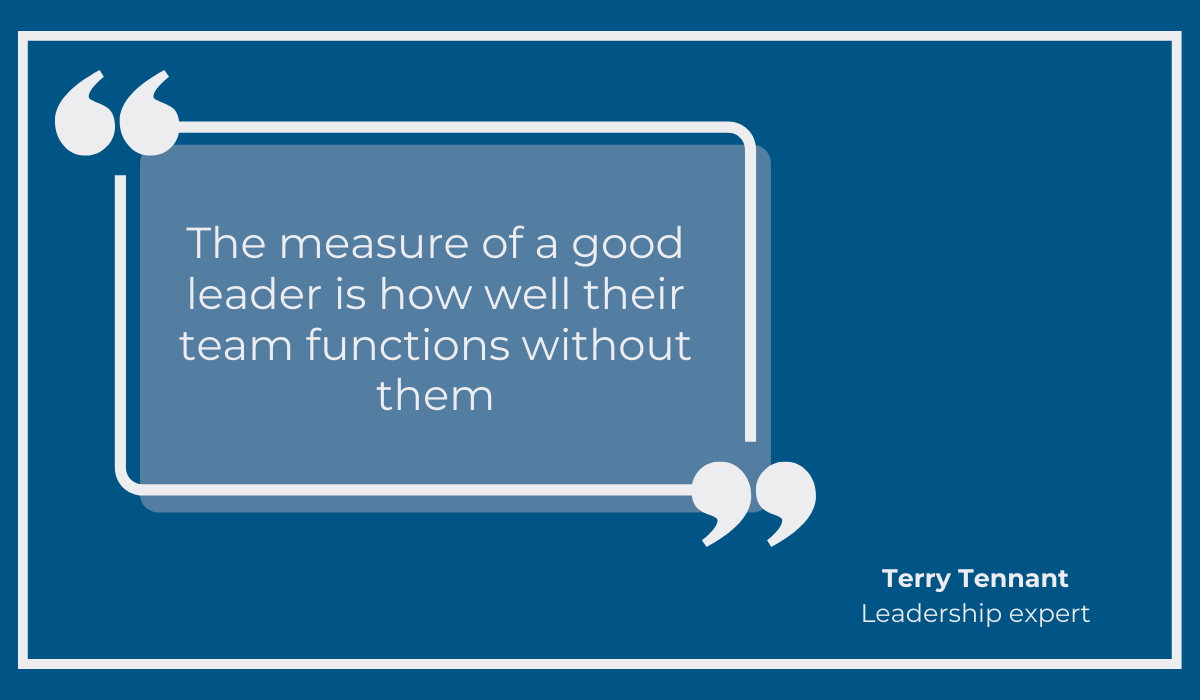
Essentially, this isn’t someone who barks out orders, micromanages, and uses the power of their position to influence people, but rather coaches the team, tries to find out what motivates them, and knows when and how to delegate.
Even when there are signs of poor performance, managers with great leadership skills will look for the root cause of the problem instead of responding with anger—they will use their authority effectively.
Remember, there’s a distinction between being a boss and being a leader, and operations managers, at least good ones, are well aware of that difference.
Communication
Another part of effective leadership is knowing how to clearly articulate ideas and information.
This is precisely why, operations managers, along with possessing the ability to motivate and coordinate, need to be great communicators as well.
Given the dynamic nature of the role, involving constant interaction with various stakeholders such as clients, contractors, suppliers, workers, and others, this skill is paramount.
Jeff Towery, Clear Construction’s Vice President of Operations, highlights the ability to effectively communicate with colleagues as the core of successful project completion.

This is what ensures everyone involved in the project understands their role as well as the overarching goals and expectations.
An excellent operations manager therefore has the talent for expressing thoughts, knowledge, and feedback with clarity and purpose, in both spoken and written form.
However, keep in mind that effective communication isn’t a one-way street.
It involves the crucial skill of active listening, too.
Top-notch communicators don’t just assert their own opinions; they’re open to hearing other people’s concerns, suggestions, and insights and understanding the intentions and emotions behind them.
Problem-Solving
If we were to distill the role of an operations manager into two words, it would definitely be “problem-solving.”
As mentioned earlier, operations managers are entrusted with ensuring safe and timely project completion, all within budget constraints.
Needless to say, this is easier said than done.
This challenge is further underscored by a 2020 survey on construction site productivity conducted by Levelset, revealing that a significant majority of industry professionals anticipate delays in their projects.
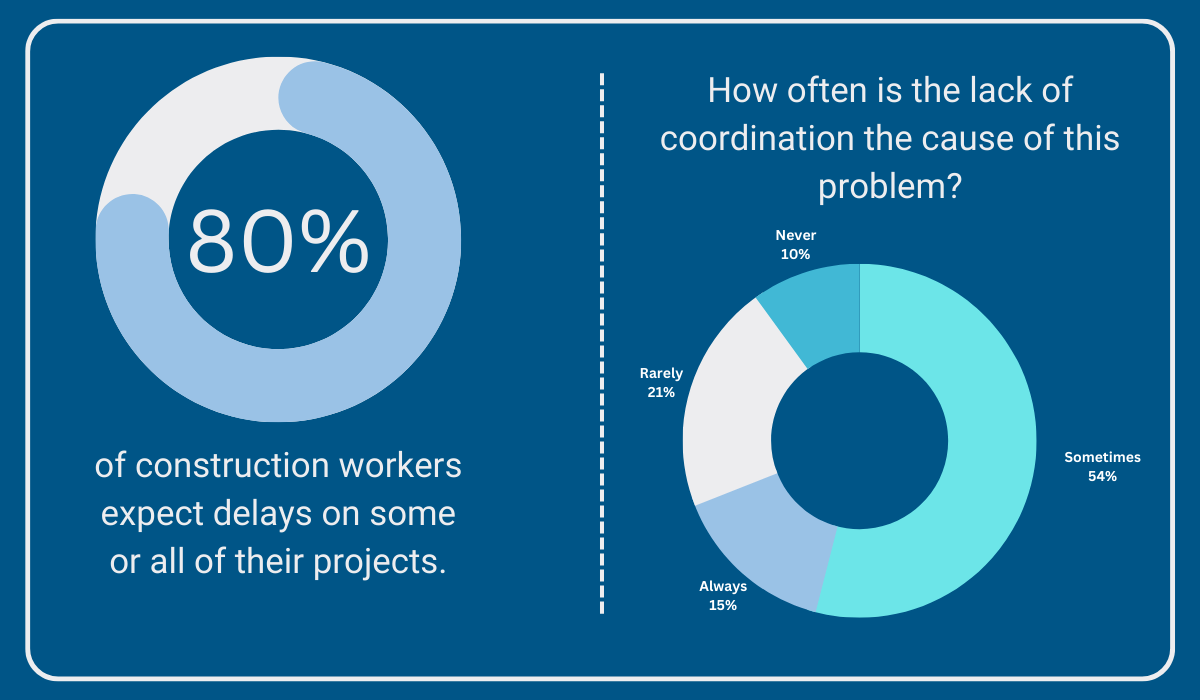
Unforeseen change orders, weather, and poor coordination among workers were identified as the primary causes of these delays.
While operations managers cannot control the weather (if this was possible, it’d certainly be part of the job), they are very much in charge of coordinating all the moving parts in order to achieve the end goal.
Therefore, a reactive approach to problem-solving doesn’t cut it here.
Instead, potential issues must be anticipated, and managers need to demonstrate flexibility in their thinking as well as the ability to adapt to each unique situation.
The skill of swiftly identifying the source of an issue, developing a solution, and implementing it is essential, too.
There’s no luxury of waiting around for problems to miraculously solve themselves in this line of work.
Using Construction Technology
An ideal operations manager should possess a solid grasp of technology and understand the invaluable support it can offer in managing daily responsibilities and tasks.
In today’s landscape, where a wide variety of specialized software and applications tailored to different aspects of construction operations are available, proficiency in utilizing these tools is non-negotiable for the role.
Relying on traditional methods like spreadsheets or paper forms to, let’s say, coordinate and track equipment maintenance is a potential red flag.
This is especially true when advanced asset management systems that store all the vital asset data, including maintenance logs, warranty information, and user manuals are now widely accessible.
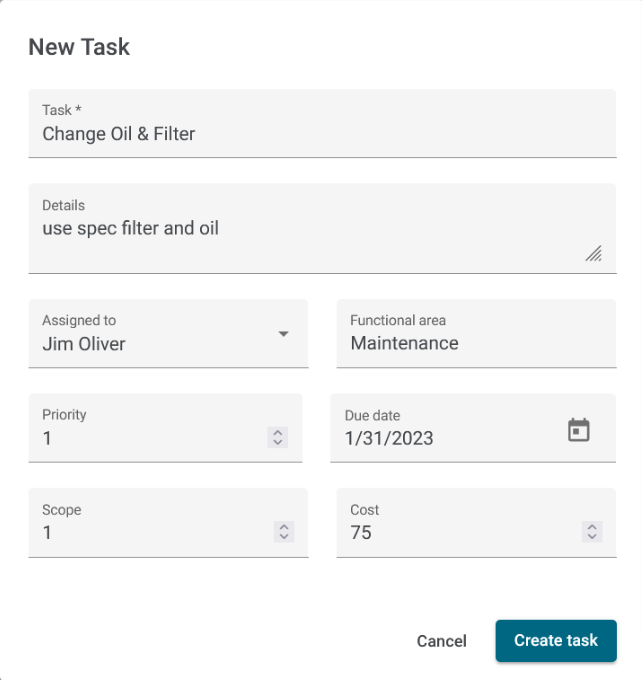
Furthermore, technological solutions streamline communication and coordination, empowering managers to assign tasks to specific employees or schedule future equipment services all from the palm of their hand, using a smartphone app.
Avoiding modern tools would mean, to put it simply, missing out on a significant boost in efficiency along with a multitude of other benefits.
Operations managers know this.
They aren’t afraid of technology, but rather, they are diving headfirst, understanding this is a more efficient, cost-effective, and reliable way of doing things.
Budgeting
Operations managers know how to stick to budgetary constraints and still be able to get things done.
However, their budgeting skill goes beyond simply adhering to the spending plan and involves knowing when to spend a bit more in order to save money in the long run.
Navigating this balance is precisely where the challenge often lies.
Taking the example of maintenance from the previous section, let’s demonstrate this principle in equipment inspections.
Allocating time and money to more frequent and thorough inspections reduces the likelihood of machinery breakdowns in the future, mitigating unnecessary replacement or repair costs as well as potential project delays.
An experienced operations manager understands the nuances of such decisions and knows when to make that call.
Furthermore, it’s not enough to just forecast and plan upcoming expenses—it’s also necessary to track past expenditures.
As emphasized by Jason Hurdis, Global Market Professional at Caterpillar, meticulous tracking is crucial for accurate budgeting.

Although he specifically addresses maintenance budgeting in this quote, the idea is universally applicable. Having a comprehensive spending history in front of you serves as a solid basis for decision-making down the road.
In the dynamic realm of construction management, the ability to create and adapt budget plans is a hallmark of a skilled operations manager.
This skill is not only about balancing the books but about strategically maneuvering the complexities of diverse projects, ensuring their success from start to finish.
Reporting
Updating stakeholders on the project’s progress throughout the whole construction process is part of the course for operations managers.
In order to do this efficiently, they need to be able to discern what information to present and how to do it in a compelling way.
Recognizing the importance of accurate and up-to-date data presented with clarity and conciseness, GoCodes decided to launch Enterprise Reporting.
This innovative addition to our equipment tracking solution streamlines the reporting process, empowering users to effortlessly generate personalized reports using a user-friendly drag-and-drop report designer.
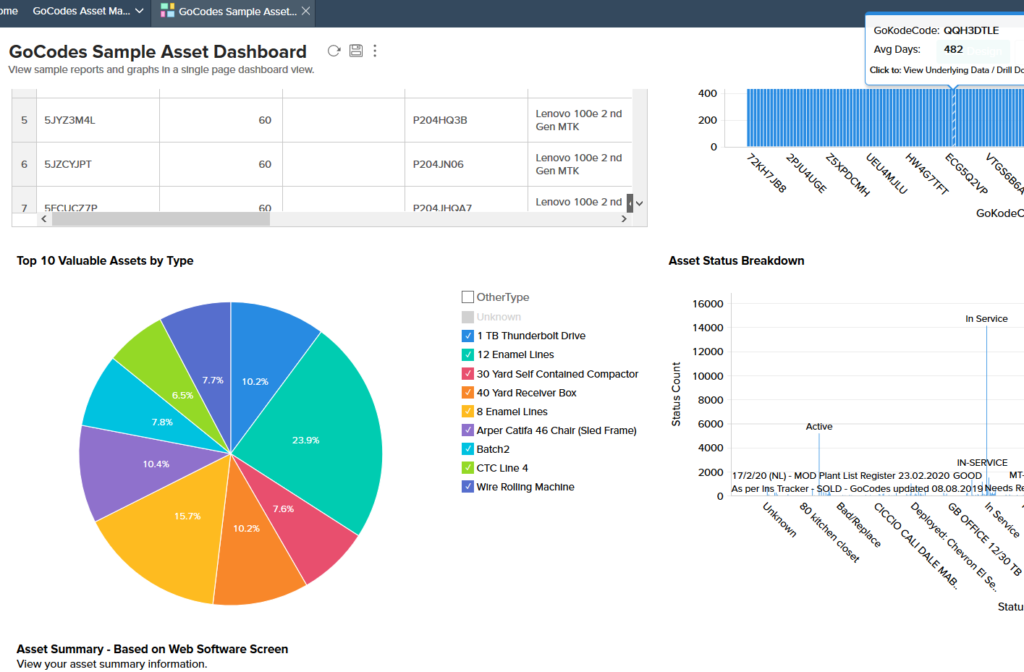
That way, information can be sorted, filtered, combined, and displayed in any way you want.
What’s more, the Enterprise Reporting feature goes beyond simply generating reports and dashboards by allowing you to create visual aids such as graphs, pie charts, bar charts, and bubble charts.
This visual layer adds another dimension to data interpretation, helping stakeholders and team members comprehend complex information more easily.
In a nutshell, mastering the art of reporting is a must for any operations manager, but here the emphasis shouldn’t necessarily be on working harder.
Instead, it’s more about embracing smart tools that make this task easier and more efficient.
Conclusion
To sum it all up, the construction operations manager is an integral player in the construction industry, ensuring projects are executed with precision, efficiency, and excellence.
The job itself is not easy, but it sure is vital.
With the ability to navigate challenges, communicate effectively, and lead a diverse team, operations managers are indispensable for the successful completion of construction endeavors.




